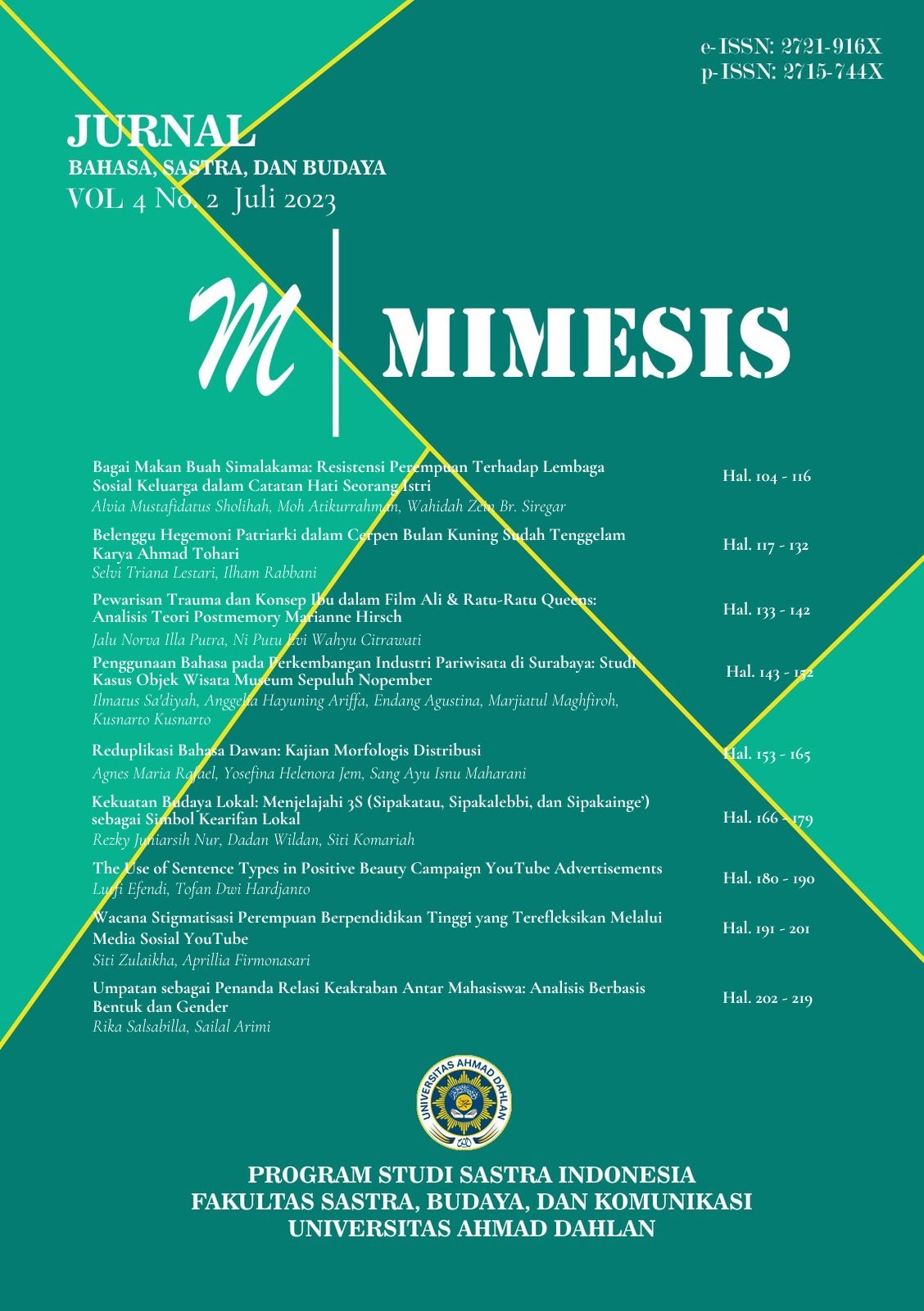Belenggu Hegemoni Patriarki dalam Cerpen Bulan Kuning Sudah Tenggelam Karya Ahmad Tohari
DOI:
https://doi.org/10.12928/mms.v4i2.7770Keywords:
Ahmad Tohari, Hegemony, Gramsci, Patriarchy, WalbyAbstract
This research seeks to dismantle the fetter of patriarchal hegemony and resistance carried out by female characters in the short story Bulan Kuning Sudah Tenggelam by Ahmad Tohari. Gramsci's theory of hegemony and Walby's thoughts on patriarchy are used as analytical tools. The method used is qualitative-descriptive. The findings of this research: The fetter of patriarchal hegemony experienced by Yuning's character occurs because of the hierarchical relationship between her and Raden Barnas as her father and his wife in the family structure. In truth, Yuning has shown resistance to the fetters she has experienced. However, it is anti-climatic because of the forgiveness of her husband's infidelity. At the same time, this condition marks the position of Yuning's figure being re-fettered by patriarchal hegemony, both in the family system and in the order of a country.
References
Bemmelen, S. van, Habsjah, A., & Setyawati, L. (2000). Benih Bertumbuh: Kumpulan Karangan untuk Prof. Tapi Omas Ihromi. Yayasan Galang.
Darwin, M. (1999, Juni 24). Maskulinitas: Posisi Laki-laki dalam Masyarakat Patriarkis [Conference session]. Center for Population and Policy Studies, Universitas Gadjah Mada, Yogyakarta. https://cpps.ugm.ac.id/publication/maskulinitas-posisi-laki-laki-dalam-masyarakat-patriarkis/
Demokrawati, H. A., & Widowati. (2015). Tinjauan Semiotika Riffaterre pada Cerpen Bulan Kuning Sudah Tenggelam karya Ahmad Tohari. Cakara, 1(2), 66–71. https://doi.org/10.30738/caraka.v1i2.1916
Fakih, M. (2020). Analisis Gender dan Transformasi Sosial. Pustaka Pelajar.
Faruk. (2017). Metode Penelitian Sastra: Sebuah Penjelajahan Awal. Pustaka Pelajar.
Gramsci, A. (2013). Prison Notebooks (Catatan-catatan dari Penjara). Pustaka Pelajar.
Harpiah, D., Wardah, E. S., & Fauziyah, S. (2018). Peran Raden Ayu Lasminingrat dalam Mengembangkan Sekolah Keutamaan Istri Tahun 1907-1948. Tsaqofah: Jurnal Agama Dan Budaya, 16(2), 223–235. https://doi.org/10.32678/tsaqofah.v16i2.3158
Israpil. (2017). Budaya Patriarki dan Kekerasan Terhadap Perempuan (Sejarah dan Perkembangannya). Jurnal Pusaka, 5(2), 141–150. https://doi.org/10.31969/pusaka.v5i2.176
Jones, S. (2007). Antonio Gramsci. Taylor & Francis e-Library.
Maulana, S. (2020). Engels Tentang Cinta, Perkawinan, dan Keluarga. In D. Mulyanto & F. Abdugani (Eds.), Friedrich Engels: Pemikiran dan Kritik (pp. 109–126). Ultimus.
Modiano, J. Y. (2021). Pengaruh Budaya Patriarki dan Kaitannya dengan Kekerasan dalam Rumah Tangga. Jurnal Sapientia et Virtus, 6(2), 129–140. https://doi.org/10.37477/sev.v6i2.335
Musa, E. P., & Nugroho, B. A. P. (2020). Kritik Sosial pada Kumpulan Cerpen Mata yang Enak Dipandang Karya Ahmad Tohari. Jurnal Prawara, 1(1), 49–65. https://doi.org/10.20884/1.jpbsi.2020.1.1.4334
Patria, N., & Arief, A. (2015). Antonio Gramsci. Pustaka Pelajar.
Riyono, A. (2016). Gaya Bahasa Kumpulan Cerpen Mata Yang Enak Dipandang Karya Ahmad Tohari. Jurnal Semantik, 5(2), 73–91. https://doi.org/10.22460/semantik.v5i2.p73-91
Sakina, A. I., & A, D. H. S. (2017). Menyoroti Budaya Patriarki. SHARE: Social Network Journal, 7(1), 71–80. https://doi.org/10.24198/share.v7i1.13820
Scott, J. C. (2000). Senjatanya Orang-Orang yang Kalah. Yayasan Obor.
Setiawan, R. (2018). Subaltern, Politik Etis, dan Hegemoni dalam Perspektif Spivak. Poetika: Jurnal Ilmu Sastra, 7(1), 13–25. https://doi.org/10.22146/poetika.v6i1.35013
SIMFONI PPA. (2022). Sistem Informasi Online Perlindungan Perempuan dan Anak. https://kekerasan.kemenpppa.go.id/ringkasan
Sofia, A. (2009). Aplikasi Kritik Sastra Feminis: Perempuan dalam Karya-karya Kuntowijoyo. Citra Pustaka.
Spivak, G. C. (1988). Can’t The Subaltern Speak? In Lewis, Reina, & S. Mills (Eds.), Feminist Postcolonial Theory a Reader. Edinburgh University Press.
Taylor, S. J., Bogdan, R., & De Vault, M. L. (2016). Introduction to Qualitative Research Methods: a Guidebook and Resource. John Wiley & Sons, Inc.
Tohari, A. (2019). Mata yang Enak Dipandang. PT Gramedia Pustaka Utama.
Tong, R., & Botts, T. F. (2018). Feminist Thought: A More Comprehensive Intro (fifth). Routledge.
Walby, S. (1990). Theorizing Patriarchy. Basil Blackwell.
Walby, S. (2014). Teorisasi Patriarki. Jalasutra.
Wiyatmi. (2012). Kritik Sastra Feminis: Teori dan Aplikasinya dalam Sastra Indonesia. Penerbit Ombak.
Downloads
Published
Issue
Section
License
Copyright (c) 2023 Selvi Triana Lestari, Ilham Rabbani

This work is licensed under a Creative Commons Attribution-ShareAlike 4.0 International License.
License and Copyright Agreement
In submitting the manuscript to the journal, the authors certify that:
- They are authorized by their co-authors to enter into these arrangements.
- The work described has not been formally published before, except in the form of an abstract or as part of a published lecture, review, thesis, or overlay journal.
- That it is not under consideration for publication elsewhere,
- That its publication has been approved by all the author(s) and by the responsible authorities tacitly or explicitly of the institutes where the work has been carried out.
- They secure the right to reproduce any material that has already been published or copyrighted elsewhere.
- They agree to the following license and copyright agreement.
Copyright
Authors who publish with Mimesis agree to the following terms:
- Authors retain copyright and grant the journal right of first publication with the work simultaneously licensed under a Creative Commons Attribution License (CC BY-SA 4.0) that allows others to share the work with an acknowledgment of the work's authorship and initial publication in this journal.
- Authors are able to enter into separate, additional contractual arrangements for the non-exclusive distribution of the journal's published version of the work (e.g., post it to an institutional repository or publish it in a book), with an acknowledgment of its initial publication in this journal.
- Authors are permitted and encouraged to post their work online (e.g., in institutional repositories or on their website) prior to and during the submission process, as it can lead to productive exchanges, as well as earlier and greater citation of published work.












